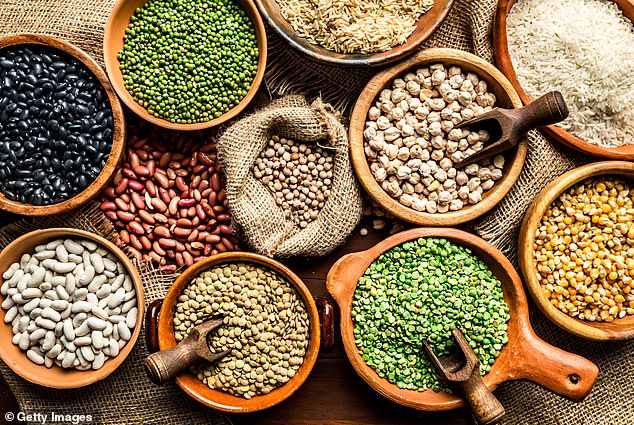- EXPLORE FURTHER: Minor skin indications around your neck signaling potential diabetes
Eating a mix of fruits, veggies, nuts, and whole grains regularly could lower your chances of getting two severe long-term illnesses, according to research findings.
A team of U.S.-based scientists has identified phytosterols—a substance present in natural food items such as nuts, seeds, whole grains, and vegetable oils—that can enhance metabolism and decrease inflammation, thereby helping to prevent heart disease and type 2 diabetes.
Nevertheless, as much as 90 percent of people in America fail to consume the suggested daily amount of fruits, vegetables, nuts, and whole grains.
Plant sterols are substances akin to cholesterol and are advocated for enhancing cardiovascular well-being and reducing blood levels of LDL (the bad kind) cholesterol because they have the ability to bind with these fatty materials.
The latest research indicates that consuming high levels of phytosterols may enhance insulin control, decrease cardiac inflammation, and support a well-functioning metabolism.
Globally, type 2 diabetes represents the most prevalent variant of the condition. More than 37 million American adults are affected by this condition. .
According to the American Heart Association, approximately 48 percent of Americans have some form of cardiovascular disease, which remains the leading cause of death in the United States—responsible for roughly one in every five fatalities.
Dr. Fenglei Wang, who led the study as a research associate at Harvard University, stated that the results endorse the idea that consuming a nutritious diet rich in plants—including ample vegetables and whole grains—can have positive effects on human health.

Phytosterols occur naturally in all types of plants; however, they are most concentrated in unprocessed plant oils such as those derived from vegetables, nuts, and olives.
Almonds, pistachios, and cashews; pumpkin, sunflower, and watermelon seeds; along with oats and barley, and legumes like chickpeas, lentils, and soybeans, all serve as excellent food sources for phytosterols.
This substance can also be found in various vegetables like artichokes, broccoli, green beans, sweet potatoes, and cauliflower, along with several fruits including pineapples, oranges, berries, and bananas.
The study tracked more than 200,000 American adults across a span of 36 years.
Participants were required to regularly complete surveys about their eating habits to assess the quantity of phytosterol-containing foods they ingested.
Their responses were subsequently assessed through multiple statistical models to determine their probability of developing Type 2 diabetes and cardiovascular diseases.
Throughout the follow-up period, more than 20,000 participants in the study were diagnosed with Type 2 diabetes. diabetes And almost 16,000 experienced heart disease.

The findings indicated that individuals consuming approximately five portions of vegetables, three portions of fruits, two portions of whole grains, and half a portion of nuts—foods rich in phytosterols—each day had roughly a 10% lower likelihood of developing these conditions.
However, hardly any Americans meet these standards.
The researchers further examined metabolites—substances produced during metabolism—and various metabolic markers found in blood samples taken from approximately 40,000 individuals to gauge how phytosterols influence the body’s calorie-burning mechanism.
They found that individuals who ingested phytosterols experienced improved metabolic function, aiding in the regulation of insulin levels and reducing inflammation around the heart.
Dr. Wang highlighted that the findings indicated consuming phytosterols might decrease the likelihood of developing Type 2 diabetes through reduced insulin resistance and could also ward off heart disease by inhibiting inflammation.
The food items examined in this study are advised for inclusion in a nutritious and balanced meal plan and have been associated with various health advantages due to their antioxidant properties and dietary fiber content.
However, the researchers in the latest study did not clarify how they determined that the advantages were derived explicitly from consuming phytosterols.
Today, the study was unveiled during the Bioactives for Brain and Cardiometabolic Health session held in Orange County, Florida. It is scheduled to appear in the journal Nutrition at a later date.
Read more
Post a Comment for "Doctors Unveil Heart Disease and Diabetes-Fighting Food That Most Americans Are Missing Out On"